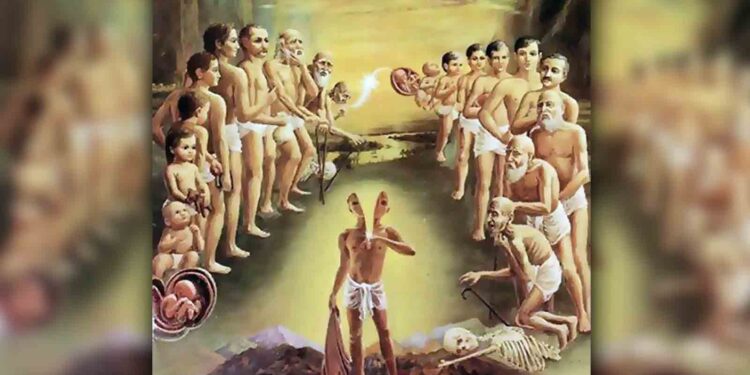Have you ever wondered why certain things happen to us? Why do some people seem to suffer while others have an easier life? Hindu philosophy explains this through karma—the law of action and consequence. Let us look at how Karma affects our lives, the role of Bhagwan in rebirth, and how we can ultimately escape this cycle.
What is Karma?
Karma means action. All actions have a consequence, whether immediate or delayed. But karma isn’t just about physical actions- it is also about the intention.
There are two types of actions. Good and bad, Punya and Paap. Good intentions and selfless actions bring inner joy and fulfillment, while selfish and harmful actions result in suffering and regret. “One cannot harvest mangoes by planting a cactus”. Actions determine what we experience later.
How Does Karma Affect Our Lives?
Karma doesn’t produce results instantly. Sometimes we face consequences right away, but we can also face them later—or even in a future life. That means some experiences we have now may be the result of actions from a past life.
Karma can sometimes seem random- good people may struggle, while bad people seem to prosper. We may try to live a good life, but still suffer. It doesn’t make sense. Why is that so? The Law of Karma says that everything is a result of past actions, but we don’t remember them. The good news? Forgetting past lives helps us focus on our present choices, without guilt or anxiety holding us back.
Types of Karma
All karma is not alike. Karma exists in three main forms:
- Sanchita Karma – The total karma we have accumulated over all our past lives.
- Prarabdha Karma – A portion of that karma, assigned to be experienced in this life—this shapes our destiny.
- Kriyamana Karma – The new karma we create in this life through our choices and actions.
Let us look at it a different way. There is a warehouse full of things. This is like our past karma (Sanchita Karma). A “truckload” of this karma is selected to be Prarabdha Karma- consequence that is bound to happen in this life. Kriyamana karma is like restocking the warehouse from the actions of this life
Rebirth and the Role of Karma
Karma doesn’t just shape our life, it also determines our rebirth. Our actions are driven by deep-seated habits called vasanas, which are our tendencies. We carry these from life to life. The goal of life is to escape from this cycle of birth and rebirth by exhausting our karmas. But in order to exhaust our karma, we must overcome our vasanas.
Our past karmas determine the parentage and environment that is best suited to help us burn through these vasanas. For example, a person with violent tendencies may be reborn as a tiger, which can express aggression without accumulating new karma, since animals act on instinct and do not accumulate new karma.
Human birth is special because we have free will. We can choose self-control and spiritual growth, or we can act selfishly and add to our karma. If we fail to exercise self-control, we may be reborn into lower life forms to exhaust negative vasanas before returning to human life.
Escaping the Cycle of Rebirth
So how do we break free from this endless cycle of birth and rebirth? If we keep chasing our desires, we may not get the happiness we want. More desires are like the bottomless well which never gets full. The more desires we fulfill, the more we crave. Instead, spiritual evolution teaches us to accumulate good karma through:
- Selflessness – Helping others without personal gain.
- Detachment – Accepting life’s ups and downs without clinging.
- Reflection – Understanding our connection to the world.
- Surrender our actions to Bhagwan – Acting without expecting rewards.
The ultimate goal is self-realization—realizing that our true nature is eternal, blissful, and universal. When we reach this state, we no longer see ourselves as the ‘doer’ of actions, and our karma is burned away, leading to liberation (moksha).
Karma-predestination or responsibility?
A common misconception is that karma means our fate is fixed. But karma is not predestination- it’s responsibility.
Our current situation is shaped by past actions, but our future is determined by the choices we make today. Making good choices will help in mitigating the past actions and shape the future. Understanding karma helps us stay calm and motivated even in tough times, knowing we have the power to control our own destiny.
Every action matters. Karma is not about punishment, it’s about growth. By making conscious, selfless choices, we can reduce our karmic burden, evolve spiritually, and ultimately attain liberation.
So, as we move forward, let’s ask ourselves: Are our actions leading us toward freedom and happiness, or are they adding more weight to our karma? Because in the end, we are the ones shaping our journey.




![[ India Today ] Ohio senator JD Vance thanks wife, a Hindu, for helping him find Christian faith](https://hinduvishwa.org/wp-content/uploads/2024/06/us-senator-jd-vance-reveals-how-his-hindu-wife-usha-helped-him-find-his-christian-faith-image-re-272530504-16x9_0-120x86.webp)










